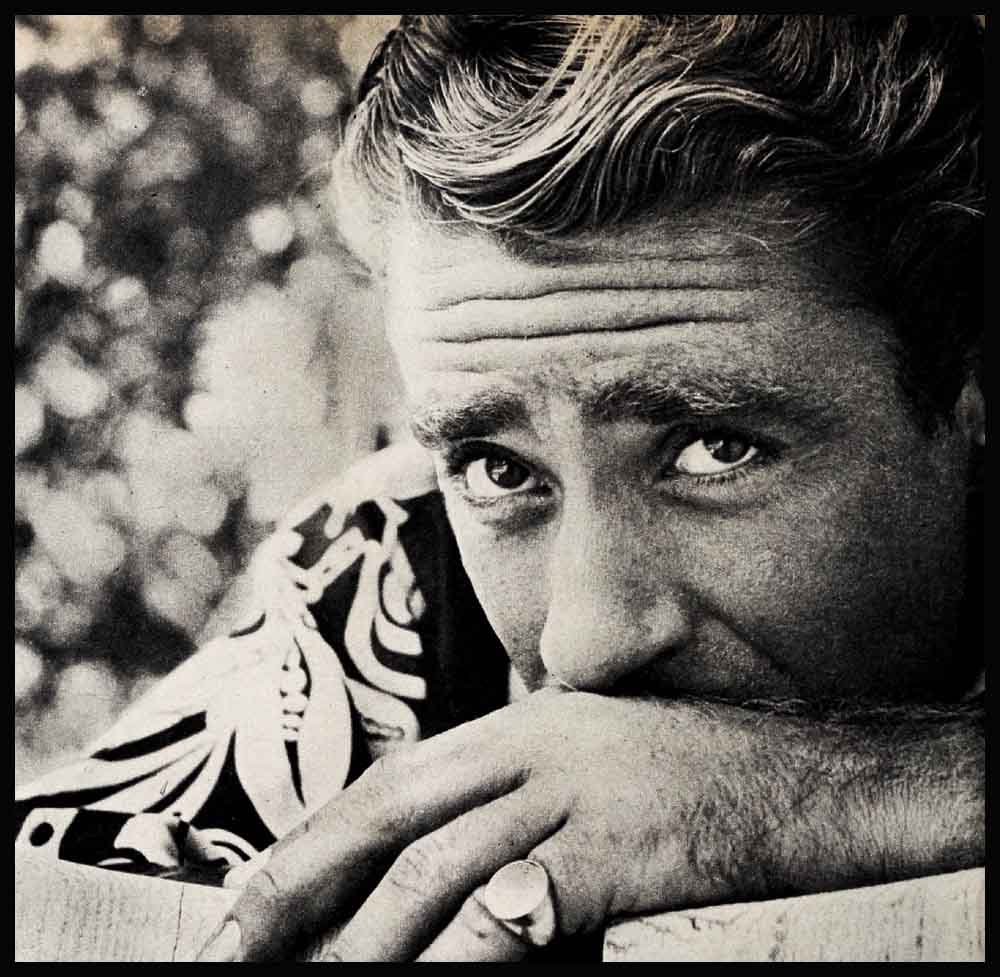
Why Are They Afraid To Marry?
What is it that makes so many of our up-and-coming young stars shy like frightened colts at the sound of wedding bells? It may be that the gold dust gets blown off their dreams by the vast number of unhappy and broken Hollywood marriages they see about them. It may be that they’re simply reluctant to give up their personal freedom. Or perhaps they hesitate to share their successes on the mistaken theory that an ego is halved—and not doubled—by marriage.
Whatever you call it in each individual case, the over-all factor adds up to a huge and unreasoning fear. Ask them what they’re afraid of—exactly what—though, and they can’t tell you themselves.
I’ve tried to find out from a dozen timid stars. They talk like mad on other subjects. On this one, they only double-talk.
Why, for instance, doesn’t Marlon Brando—with $100,000 per picture to share with some lovely damsel—shake himself loose from his moods and go find her? What really makes Vera-Ellen—married young, divorced young—give the brush to her beaux each time it begins to look like a wedding? Why does Steve Cochran, the big he-man hero, quake at the thought of the plunge? And what about June Haver? How come she’s not brave enough to marry again? Or Ann Blyth to marry—period.

Always the spare man, the socially useful bachelor, never the man—that’s Peter Lawford. Dan Dailey poses as the woman-hater, making absolutely no sense when he shoots ofî his mouth against females in general and wives in particular. Farley Granger is twenty-seven now—quite a big boy—but so far he hasn’t outgrown such childish tricks as giving Shelley Winters that mock engagement ring. Jean Peters fools nobody by pretending to be so dedicated to her career that she has no time to be a wife. Again, the talk hides fear. What are they all afraid of?
There isn’t any general answer to cover every marriage-shy star. In each case, the bogey is something personal, deep in hiding. Vera-Ellen, for instance, is like a kitten walking a fence—she’s so cautious about her romance-life. Of course, I think she’s right to be leery of hitching her star to the wrong marital wagon for the second time. But Vera’s utter lack of normal, human impulsiveness in this department reminds me of the boys and gals who win Oscars and are then so careful about choosing the next picture that they never make another.
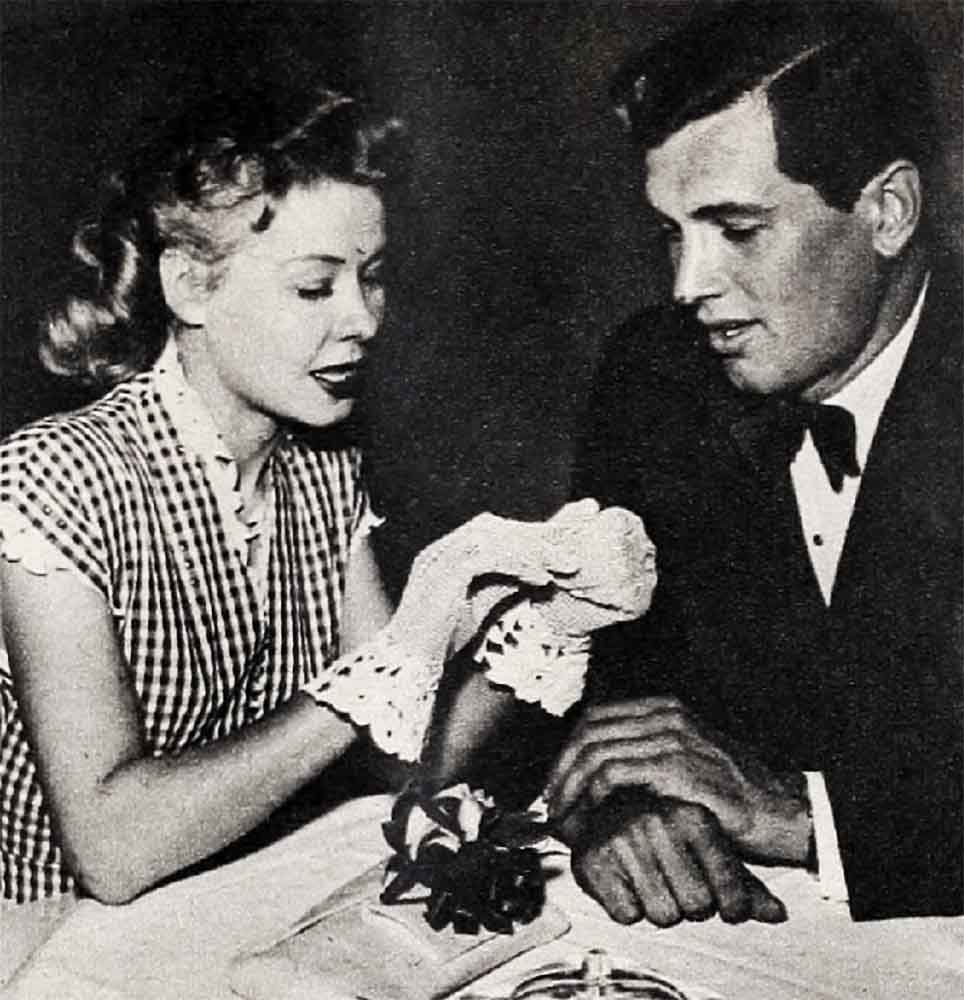
In recent months, I’ve often seen Vera with Henry Willson, the successful and personable agent. Henry tells me that he expects to marry the girl; he’s even building a house as a lure she can’t resist—he thinks. But the lady in the case, questioned about her intentions, smiles vaguely and counters by talking about her dates with Ernie Byfield. At that point, I decide she must be serious about Ernie. Next thing I know, I see her with Rock Hudson, even though these two had said a not-so-fond farewell months ago.
I don’t know exactly what happened between Vera and Rock, but it couldn’t have been pleasant, to judge by Rock’s bitterness when he discussed the break-up. In the days when it looked really serious, he said the marriage was being postponed “because I can’t marry a girl who makes so much more money than I do. When Vera marries me, she’ll have to live on my income.”
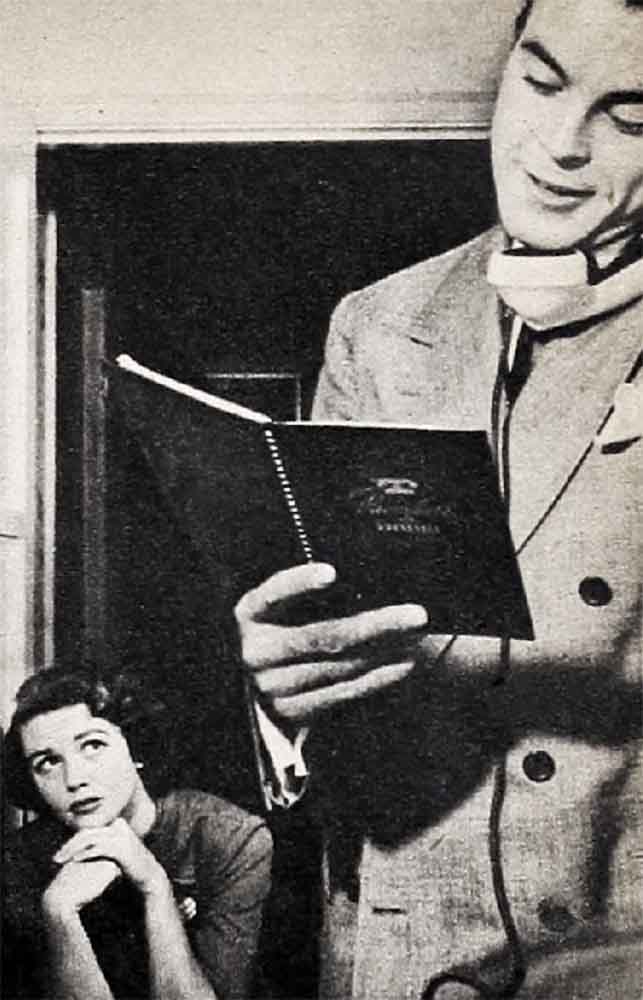
I suspect that suggestion didn’t set so well with Miss Vera-Ellen. She’s a very independent-minded girl, a well-balanced personality—maybe a little too well-balanced for her own good. Her opinions about running her own career, about regulating her life in general are clear and precise. Could be that, deep inside, unknown to herself, she’s wary of becoming in any sense dependent on another person. A true marriage means inter-dependence, and it does take courage to surrender part of yourself into another’s keeping. Perhaps Vera just can’t get up enough nerve.
Rock tried to be understanding about her career problems; he even okayed her dates with better-heeled guys who could take her to Ciro’s and Romanoff’s and Mocambo, where she’d be photographed with the elite of Hollywood for the fan magazines and newspapers. That was probably a mistake in Rock’s strategy. Seems Vera got used to going out with other men, and thus her ties with Rock were weakened. But I wouldn’t write a permanent finis to this romance. These two have meant a great deal to each other, and some day Vera may realize that you can’t be both completely self-sufficient and completely happy.
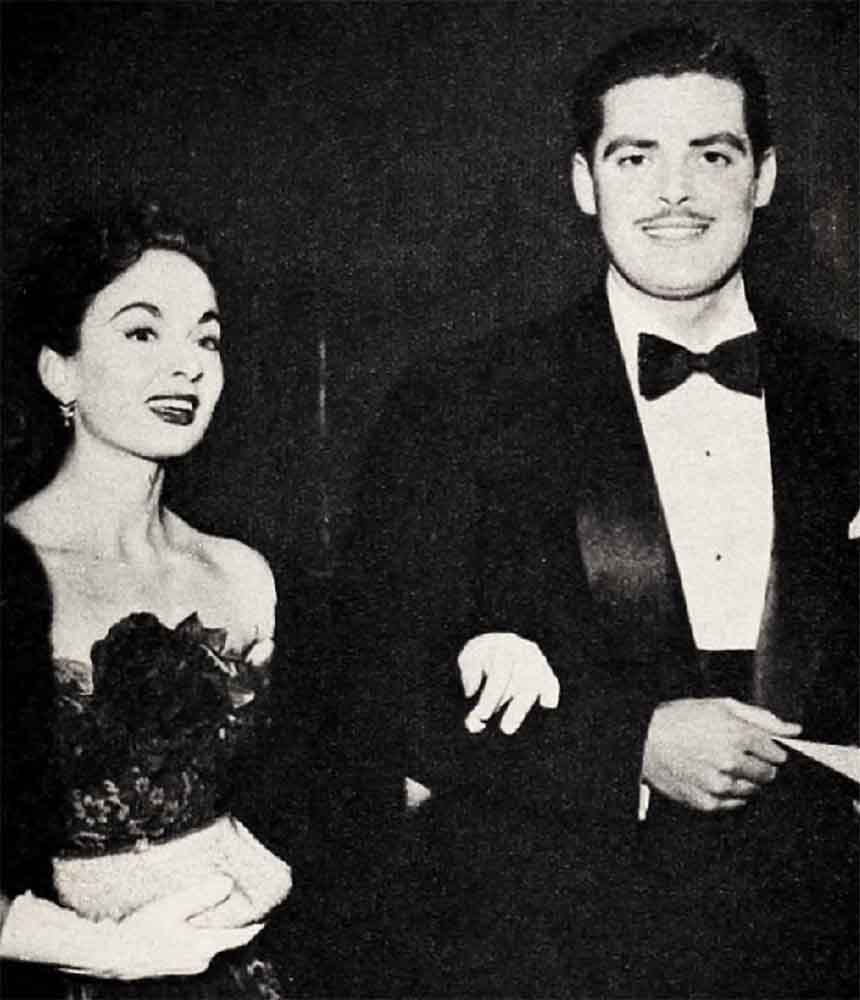
Meanwhile, the tali, dark and oh-so-handsome Mr. Hudson is having a ball with all the young, middle-aged and getting-on-to-be-elderly girls in this fascinating neck of the woods. You can hardly name an unattached girl in town whom Rock hasn’t dated. On his list: Rocky Cooper, Nancy Sinatra, Marilyn Maxwell, Gene Tierney, Barbara Stanwyck—with eighteen-year-old Susan Zanuck, Darryl’s sprig, thrown in for good measure. To date, his success with the ladies hasn’t spoiled him. I’m keeping my fingers crossed, believing that Rock’s playing a waiting game. I think he’s settling for pleasant companionship, steering clear of strong attachments, hoping that Vera will overcome her qualms.
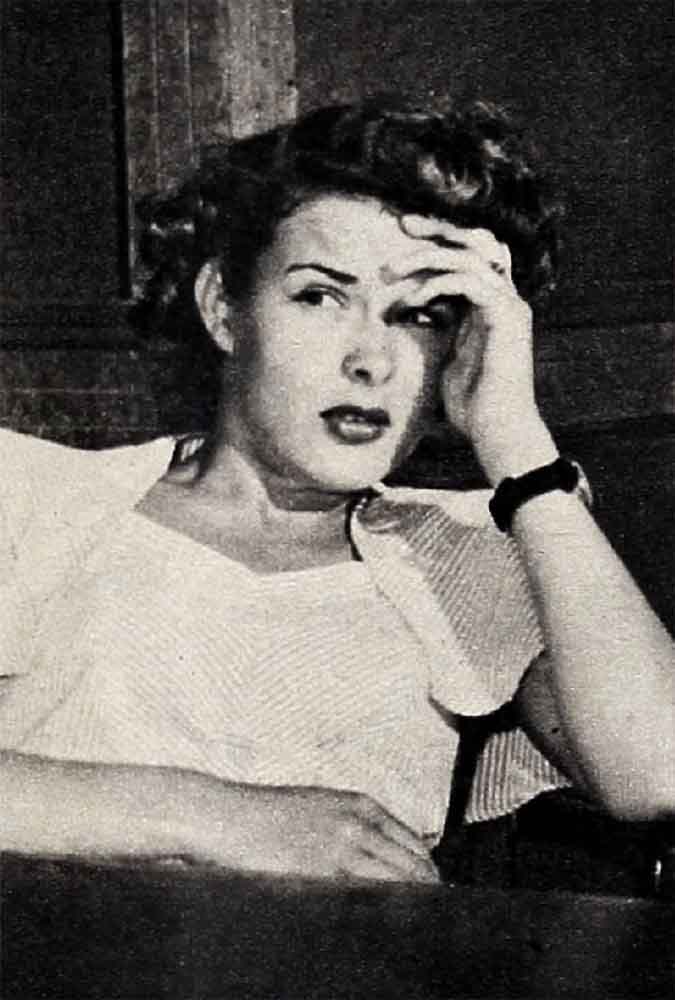
I called another gent-on-the-loose to check a rumor, and found myself accepting a date to dine at Romanoff’s with Dan Dailey. Somehow or other, the conversation got around to love and marriage. And I was startled to hear Dan deliver a series of blasts against both. “it took me twenty years to find out what I really want in life,” he told me, “and I’ve never been as happy as I am now. Women! Wives! I can do without them.”
As everybody knows, the end of his marriage was a drawn-out, grueling business, likely to leave anybody bitter. But when I suggested this explanation, hesitantly, Dan replied in obvious anger, “Liz? I was never in love with her!” I’m sure he thought he was speaking the truth. But there was too much emotion in his voice. The break-up of a truly loveless marriage is usually accompanied by mere boredom or annoyance. This boy, I decided, is whistling in the d ark, trying to get over his hurt by telling himself it isn’t there.
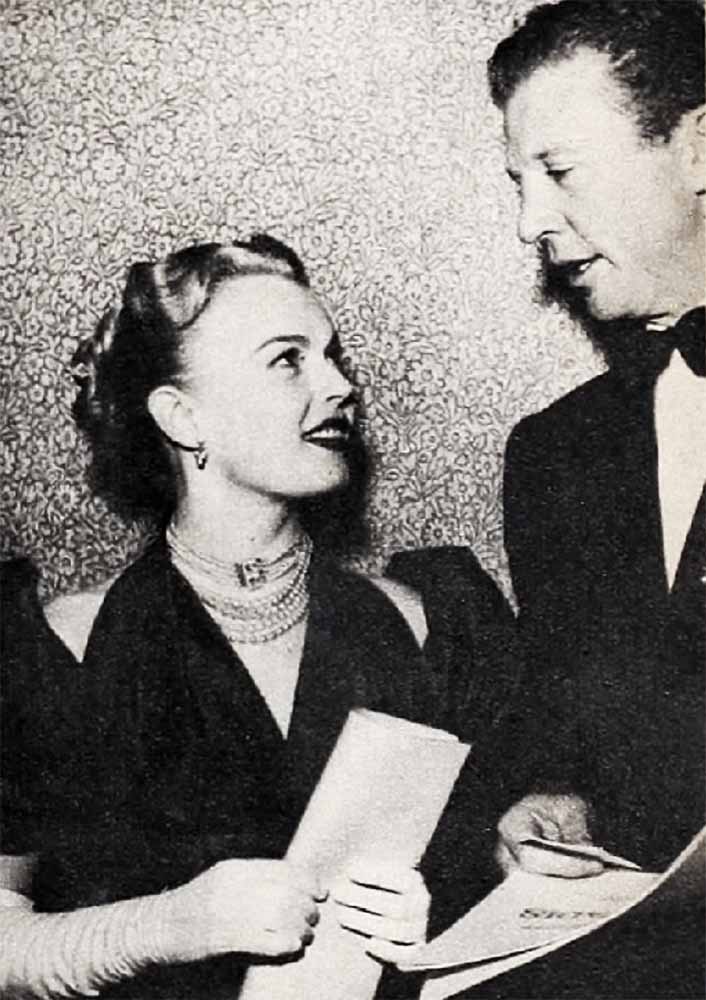
And that’s what lies at the heart of Dan’s fear. It’s the fear of being hurt once more. I think he will many again, in spite of all his violent words. But he’ll have to do some figgerin’ first. He’ll have to learn to understand his own reactions. Because his marriage failed, it doesn’t mean that marriage per se is no good. Because he’s beginning to enjoy living alone, eating when he feels like it, operating freely with I no need to devote time to a wife and family, it doesn’t mean that he’ll never find a girl who can fit into his way of life. There might even be a someone—and I hear there is a someone, in Pasadena—who enjoys the racket he makes with his trombone, and wouldn’t banish him to a shed in the garden or to his dressing room at the studio, to blow off steam. Anyway, I hope Dan finds his Mrs. Dream Dan (even though he say s he isn’t looking for one), because he’s a darling.
And I hope June Haver may one day find the feller she deserves. In her case, the source of fear is much more obvious. Her marriage was thoroughly unhappy, bruising to the soul. And, as you know, June is very religious, schooled to look on marriage as a permanent bond, Being forced to break it was a shattering experience. She’ll never wed again without the consent and blessing of her church; in fact, she went to Rome two years ago to plead for an annulment. In her short life, June has done penance with too much tragedy: the death of the one man she d id love, Dr. John Duzik; her own illness; her misfortunes.
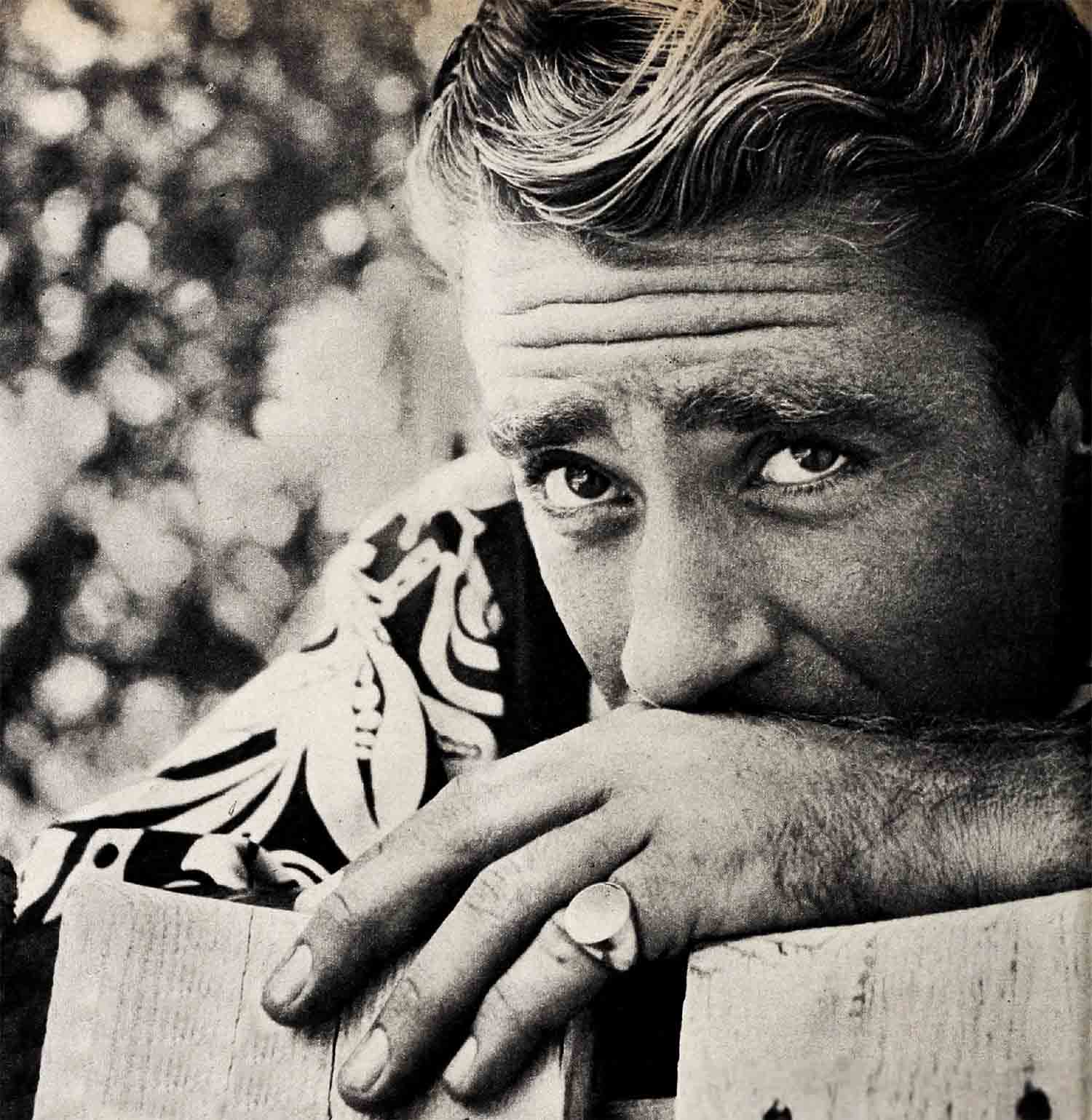
Her emotional upsets have taken their toll physically, as well as spiritually. Women aren’t as subject to ulcers as men, but June has enough for a dozen men. More hospitalization—and operations—followed after she missed the leap into Dan Dailey’s arms for that ill-timed dance number in “The Girl Next Door.” (Such timing s a delicate thing, easily affected by one’s State of mind ) Dan used to visit her in the hospital, but both were so full of woe they had no time for woo. June needs a husband more than any girl in Hollywood, and I devoutly hope that, when the time is right, she’ll take her destiny in her two quite frail hands and go forward to meet married happiness.
Jean Peters is another who seems more than moderately wary She’s a mature-minded and highly intelligent young lady; yet she insists that she’ll never marry, that her heart belongs to her career. I don’t know who she’s kidding; I hope it isn’t herself. True enough, her career is now on the up-grade, but any girl with Jean’s brains knows that the finest of careers alone can’t provide a full life. For a long time, Jean was deeply in love with a producer. She’d have married him in a minute—if he’d ever asked her.
It’s my guess that Jean still loves him. So she announces her devotion to her career by way of signaling to her producer that he has no real rival. Or perhaps she has lost hope, fears she’ll never find love again, is trying to give romance in general the old sour-grapes treatment. The first is bad strategy, and the second is worse psychology, and I’m betting that Jean’s smart enough to snap out of it if her hopes aren’t realized.
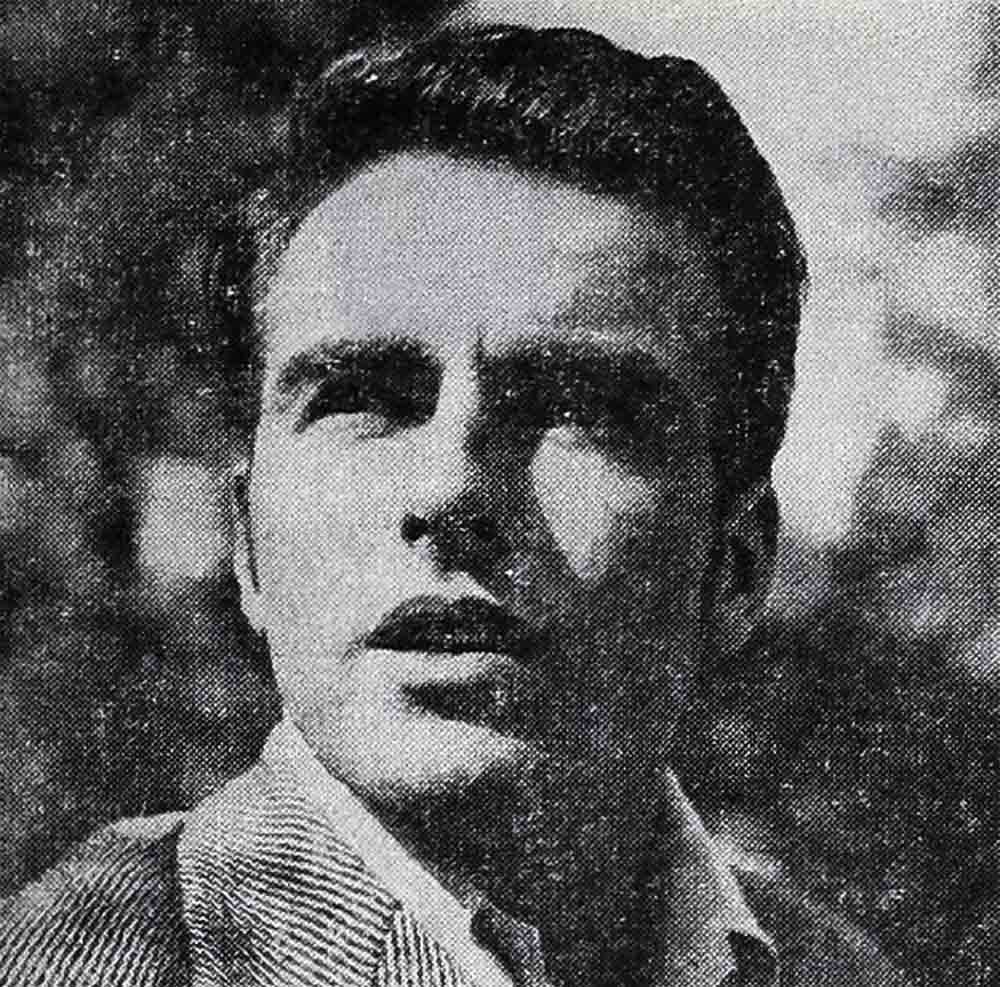
Steve Cochran’s even more the romantic enigma. He’s always on the verge, but never merges (not recently, at any rate). Any girl, any time, any place—but strictly laughs, or strictly business—that’s our little Stevie. I suspect he was boasting when he implied that Mae West was quite enthralled with him. I know he was when he let slip the story that Ginger Rogers was expecting to keep a rendezvous with him in Mexico. Steve showed up there, all right—only to find that his alleged lady-love had flown, to her ranch near Rogue River.
Then there was Steve’s beeg romance with Denise Darcel. He went to the station to meet her when she was returning to Hollywood. By an amazing coincidence, there was a photographer on hand. So what happened? Nothing. I’m not sure whether it’s Steve who is scared of marriage, or the girls who are scared of Steve. But I’ll hazard another guess: Here is a fellow who’s settled contentedly into bachelorhood after two divorces, who’s scared of losing the freedom to pursue fun or publicity wherever he finds it. Oh well, he has his dog and his parrot to keep him warm. And, just because he feels so secure in his bachelorhood, he’s likely to find himself some fine day securely snared by some enterprising lady.
Ann Blyth, Hollywood’s nicest unmarried lady, tells me she will marry only once. So it’s essential for Annie to hit the matrimonial bull’s-eye with the first shot. It’s sad and ironic that the only guy she’s showed a real interest in should get into hot water with the Army—and I do mean Dick Contino. By the time he straightened himself out, he was out of Ann’s life. At the moment, Maureen O’Hara’s brother Charles FitzSimons seems the only likely replacement, but there will probably be others.
Just recently, Annie has developed a flair for tasteful clothes and meticulous grooming, and this, I think, may be the first sign that she is growing up psychologically. Strangely enough for a girl who has been in show business since childhood, she’s led a rather sheltered life, absorbed in her work, tenderly cared for first by her mother and later by her aunt and uncle. More youthful than her years, Ann may have had the young girl’s usual timidity with men, except on a comradely basis. And I’m sure this possibly slow maturing is going to produce an essentially lovely woman.
While there had been marriage rumors about them for a long time, nobody ever really believed that Farley Granger and Shelley Winters would get married though the noise they—especially Shell—made about their friendship was so deafening you could hardly hear the truth Farley was out of character during that interlude. He isn’t the type to go whooping around night clubs. The sensitive Farfel (“Noodle”), as Shelley used to call him, prefers listening to classical records, reading, collecting paintings, or (when in Paris) philosophizing with existentialist friends on the Left Bank. That intellectual life is probably more peaceful than the average marriage. Farl keeps saying he’ll get married some day, but if Shelley couldn’t arouse this young aesthete from his dream, what girl could?
Another Hollywood maverick, Marlon Brando, is so busy finding mates for his pet raccoon, he’s left with no time to find a wife for himself. And that’s probably just as well. Breathes there a girl, do you suppose, with fastidiousness so dead she could tackle this untidy broth of a hulking boy? Maybe Marlon’s afraid there is such a girl, and he shudders to imagine the marital dialogue: “Where are my jeans?” “I threw them out in the trash!” . . . “Well, I’m ready to leave.” “Marlon, I won’t go a step with you unless you put on a respectable suit—and a tie!” And that, very likely, does it.
Compared to Brando, Montgomery Clift’s a fashion-plate, but he’s still another maverick. Personally, I think Monty would like to marry; what stops him is a terrific inferiority complex that stems from his lack of height, in a profession crowded with six-footers. When I first met Monty, I was startled to find myself almost looking down on him, and I’m no Amazon. This feeling of insecurity might account for his long-time association with an older woman, Myra Letts, who used to travel with Monty wherever he went—giving him acting lessons, it turned out! And all the time I thought they were discussing marriage plans.
There’s another fact that makes Monty shy of marriage: He’s a perfectionist. And there are few women alive today (or yesterday or tomorrow) who could measure up to his high standards. Certainly not Liz Taylor, nor Barney Balaban’s daughter, nor the secretary at MCA, to mention a few of his dates.
Also an ex-beau of Liz (and practically every eligible gal in sight), Peter Lawford has told me many times that he won’t marry until he’s thirty. Well, he’s now twenty-nine, with no serious romance in his life. Scott Brady, now twenty-eight, has told me he’s made the same resolution. Both boys, I think, are wary of the responsibility that goes with a wife and family. But Pete’s the more likely to stay footloose. Though Scott has loved and wooed Dorothy Malone for two years, has he ever nerved himself up to the point of a proposal? I doubt it, because I believe Dotty would have said, “Yes.” But she’s a gal with a mind of her own, and possibly Scott’s been afraid she might say, “No”—quite a blow to the masculine ego.
Dotty may very well be weary of waiting for Scott to come out with an honest-to-goodness “Will you marry me?” Or he may be waiting for her to arrange her career so that she can stay in Hollywood. Either way, I think they still may marry. That goes for ninety per cent of these marriage-shy stars. all their assorted fears aren’t strong enough to cancel out the normal human craving for a lifelong companion.
THE END
It is a quote. PHOTOPLAY MAGAZINE OCTOBER 1952




